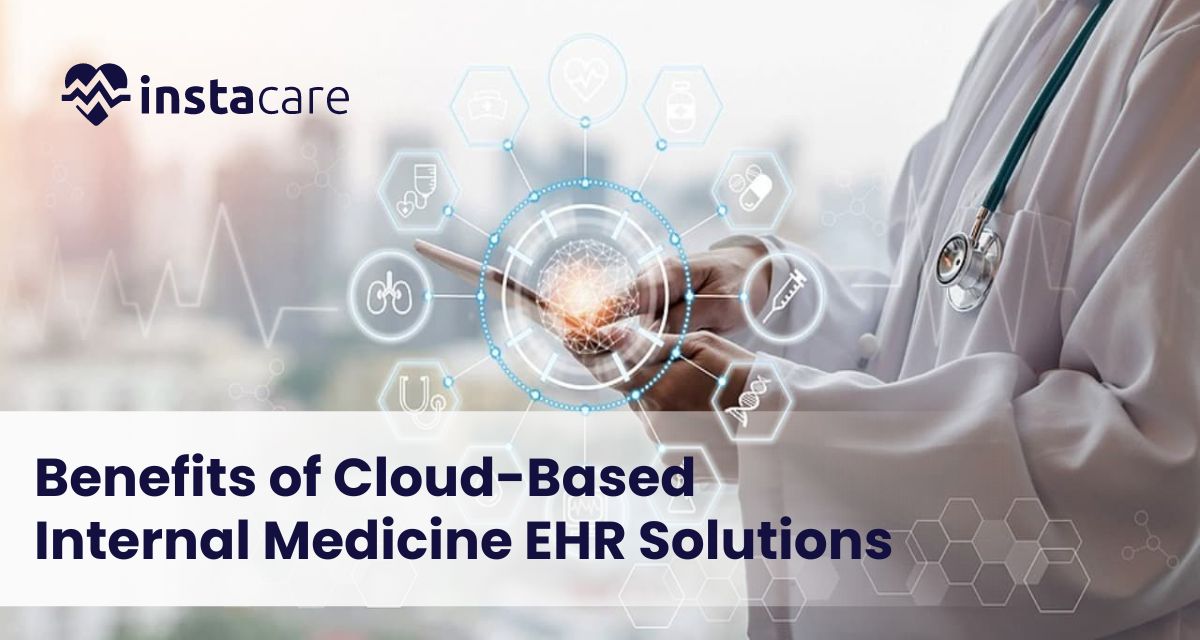Last updated on Monday, 24, June, 2024
Table of Contents
What Are The Benefits of Cloud-Based Internal Medicine EHR Solutions
In the fast-moving world of internal medicine—efficiency, accuracy, and patient-centered care have been hallmarks of care for years. Providers can navigate that maze in many ways to make modern healthcare delivery work, but contact with innovative solutions is not an option. One of those innovative solutions is Cloud-Based Internal Medicine EHR Solutions.
Here Are Some Of The Valuable Benefits To Know
The following are a number of benefits in which Cloud-Based Internal Medicine EHR Solutions change health delivery for health providers by maintaining patient records, managing workflows, and providing care up to the best of one’s ability. Let’s analyze the advantages in great detail.
1-Improved Accessibility and Flexibility
Gone are the days when healthcare providers were restricted within the four walls of their office premises for their patient records. With cloud-based EHR solutions, a doctor can have a secure way of accessing patient information at his convenience from virtually anywhere, round the clock. Be it from the hospital, clinic, or even at one’s home, the ability to fetch critical patient data on the go means that more informed decisions can be made promptly. This improved accessibility not only optimizes efficiency but also enables healthcare providers to extend their service well beyond the walls of traditional healthcare environments.
2-Better Collaboration and Coordination
Healthcare is primarily a team sport in which effective collaboration and coordination is the name of the game. Cloud-based EHR systems support the achievement of this collaboration through the development of a single centralized platform through which various healthcare professionals access and update real-time patient records. From primary to specialty care physicians, nurses to pharmacists, everyone involved in a patient’s care journey will have a chance to contribute to and make use of a single view of patient information. This enables easy sharing of information and teamwork, finally leading to comprehensive and patient-centered care.
3-Greater Data Security and Compliance
In a time when the threat of a data breach is ripe, the ability to secure patient information is most important. Cloud-based EHR solutions come with state-of-the-art and cutting-edge security measures that will protect sensitive health data against access, breach, and other potential cyber threats. Utilizing advanced techniques for encryption, robust authentication protocols, and frequent updates in security guarantee that the sensitive patient information remains safe and that stringent regulatory requirements, such as HIPAA, are met. Inherent risks can be lowered by healthcare organizations, who store their data with reputable cloud providers, without losing patient trust and maintaining the level of confidentiality.
4-Cost Effectiveness and Scalability
Healthcare organizations that have traditionally implemented and maintained on-premise EHR systems require heavy upfront investments in terms of hardware, software, and infrastructure. On the other hand, cloud-based EHR solutions, by their nature, are predictable with low-cost alternatives, including subscription-based pricing. The scalability and flexibility offered by cloud are such that a healthcare organization won’t have to invest in capital expenses upfront or face the associated maintenance costs down the line. Additionally, these solutions can expand with small independent practices and large healthcare institutions as per their needs, and their scalability is actually up and down. All these processes free the organizations concerned from the limitations imposed by a physical infrastructure.
5-Workflow and Productivity Improvement
Healthcare providers are all too aware of the administrative burden that accompanies paper-based or legacy EHR systems. Cloud-based EHR solutions alleviate that by automating routine administrative tasks, streamlining workflows, and reducing manual errors. Features that tend to streamline operations, including electronic prescribing, appointment scheduling, and billing integration, allow the healthcare professional to focus more on the right patient care and less on the paperwork associated with it. In addition, intuitive user interfaces and template options further boost documentation efficiency, enabling more time for providers to be with patients rather than trying to work through intricate systems.
6-Enhanced Patient Engagement and Satisfaction
In the world of digital health, patients are increasingly informed and active in their health and care journey. Cloud-based EHR solutions make patients feel empowered with online portals that offer secure access to their health records, booking appointments, asking for prescription renewals, and communicating with health providers. The transparency of information fosters a sense of empowerment, trust, and collaboration between patients and providers, leading to improved patient satisfaction and outcomes. By enabling patient-centered technologies, healthcare organizations can further grow the bond between patients and providers, driving positive patient experiences.
7-Advanced Analytics and Insights
Cloud-based EHR solutions act as repositories of patient data but also serve as a conduit to extract meaningful and actionable insights using advanced analytics. By making use of machine learning algorithms and predictive analytics, healthcare providers can come up with significant trends, patterns, and potential risk factors associated with the patient populations. From predicting disease progression to identifying opportunities for early and preventive intervention, this information will equip the provider to take intelligent decisions that will further support optimization of not only patient outcomes but the most efficient utilization of resources. In addition, analytics capabilities facilitate a health organization to measure and monitor key performance indicators, identify areas for improvement, and drive continuous quality improvement initiatives.
8-Interoperability and Integration
In a modern healthcare ecosystem, interoperability and integration of information from different systems must be seamless to ensure coordinated and comprehensive care. As such, cloud-based EHR solutions become the backbone for the exchange and aggregation of health data from across various healthcare settings and stakeholders. Cloud-based EHR systems, through standardized data exchange protocols such as HL7 and FHIR, seamlessly integrate with other healthcare applications in use at facilities, including laboratory information systems, imaging systems, and telehealth platforms.
Conclusion
In conclusion, Cloud-Based Internal Medicine EHR Solutions are transformative to health provision, which is a bouquet of benefits that empowers healthcare providers to deliver high-quality, patient-centered care in a progressively digital world. Ranging from increased access and collaboration to security and efficiency, the benefits of cloud-based EHR solutions are immense. The operations of healthcare facilities that embrace these innovative technologies will be future-proofed while enhancing clinical workflows, thus putting the health and well-being of their patients at the center.
FAQs
1-What is Cloud-Based Internal Medicine EHR?
Cloud-Based Internal Medicine EHR is an effective and robust EHR application that takes care of and retains a patient’s health information in a secure online environment. Unlike traditional, paper-based, or on-premise EHR models, cloud-based EHR solutions incorporate off-site storage maintained by third-party providers, thereby allowing healthcare providers to remotely access patient records from across the globe, as long as they can access the Internet. This makes cloud-based EHRs more accessible and ensures far better flexibility and scalability.
2-How are the data in Cloud-Based Internal Medicine EHR solutions made secure?
Cloud-Based Internal Medicine EHR solutions are secure and aim to protect patient data from access by unauthorized parties, data breaches, or cyber threats. This is ensured with the help of encryption techniques, the utilization of access controls and multi-factor authentication, and regular security updates in cloud solutions. Cloud providers adhere to industry standards and regulations, such as HIPAA, which guarantee compliance and data confidentiality.
3-What are the main benefits of a Cloud-Based Internal Medicine EHR?
A cloud-based internal medicine EHR provides health providers and patients the best benefits. This includes better access and flexibility, improved collaboration and coordination among various healthcare teams, better security and compliance with data regulations, cost efficiency and scalability, workflow and productivity streamlining, and increased patient engagement and satisfaction. For that reason, health organizations should implement the cloud-based technology in optimizing clinical workflows to ultimately result in positive patient outcomes.
4-How can health organizations avail themselves of the transition to the Cloud-Based Internal Medicine EHR?
The process of adaptation while using the cloud-based Internal Medicine EHR should be well planned, implemented, and duly trained so that there are no hiccups when taking on the new system. Health institutions are required to evaluate their current IT infrastructure and their exact needs and requirements before settling on a cloud provider who is reputable and guarantees security, complies with standards of the field, and guarantees scalability. Human resources in a medical institution should be adequately trained through different training programs to understand the new system well and learn how to utilize the functionalities of a cloud-based EHR.



